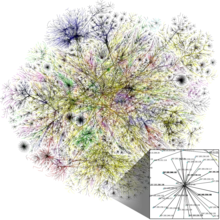Eternal September
Eternal September or the September that never ended[1] is Usenet slang for a period beginning in September 1993,[2][3] the month that Internet service provider America Online (AOL) began offering Usenet access to its many users, overwhelming the existing culture for online forums.
Before then, Usenet was largely restricted to colleges, universities, and other research institutions. Every September, many incoming students would acquire access to Usenet for the first time, taking time to become accustomed to Usenet's standards of conduct and "netiquette". After a month or so, these new users would either learn to comply with the networks' social norms or tire of using the service.
Whereas the regular September student influx would quickly settle down, the influx of new users from AOL did not end and Usenet's existing culture did not have the capacity to integrate the sheer number of new users.[4][5] The influx was exacerbated by the aggressive direct mailing campaign by AOL Chief Marketing Officer Jan Brandt, which most notably involved distributing millions of floppy disks and CD-ROMs with free trials of AOL.[6]
Since then the popularity of the Internet has led to a constant stream of new users. Hence, from the point of view of the early Usenet, the influx of new users in September 1993 never ended.
Dave Fischer appears to have coined the term in a January 1994 post to alt.folklore.computers: "It's moot now. September 1993 will go down in net history as the September that never ended."[7][3]
Legacy
A tongue-in-cheek program called sdate outputs the current date, formatted using the Eternal September calendar (September X, 1993, with X an unbounded counter for days since that epoch).[8] This is not the identically named sdate, one of the sixty commands that comes with the First Edition of Unix, that is used to set the system clock.[9]
The term is alluded to in Thomas Pynchon's 2013 novel Bleeding Edge, set largely in dot-com era Silicon Alley, where a "disused techies' saloon" is named "Eternal September".[10]
AOL discontinued its Usenet service on January 25, 2005.[11]
References
- Eric Raymond. "September that never ended". The Jargon File (version 4.4.7). Archived from the original on September 14, 2008.
- Grossman, Wendy M. (1997). "The Year September Never Ended". Net.wars. New York University Press. pp. 4–17. ISBN 978-0-8147-3103-1. OCLC 37451759. Archived from the original on June 26, 2006.
- Koebler, Jason (September 30, 2015). "It's September, Forever". Vice. Archived from the original on December 13, 2017.
- Grossman, Wendy M. (1997). "The Making of an Underclass: AOL". Net.wars. New York University Press. pp. 31–41. ISBN 978-0-8147-3103-1. OCLC 37451759. Archived from the original on May 5, 2011.
- Lily Rothman (May 22, 2015). "A Brief Guide to the Tumultuous 30-Year History of AOL". Time. Archived from the original on December 3, 2016.
- Siegler, MG (27 December 2010). "How Much Did It Cost AOL To Send Us CDs In The 90s? "A Lot!", Says Steve Case". Archived from the original on March 5, 2017.
- Walter Isaacson (2014). The Innovators: How a Group of Inventors, Hackers, Geniuses, and Geeks Created the Digital Revolution. Simon & Schuster. p. 401. ISBN 978-1476708690.
- "Never Ending September Date - df7cb.de". df7cb.de. Archived from the original on February 2, 2009.
- "sdate(1) - Unix First Edition Manual Page". cat-v.org. Archived from the original on 2014-05-30.
- Pynchon, Thomas (2013). Bleeding Edge. London: Jonathan Cape. p. 174. ISBN 9780224099028.
- "AOL Kills Usenet Access". slashdot.org. Archived from the original on December 20, 2018.
External links
- TheSeptemberThatNeverEnded at MeatballWiki
- sdate, a Unix program that outputs the date of Never Ending September
